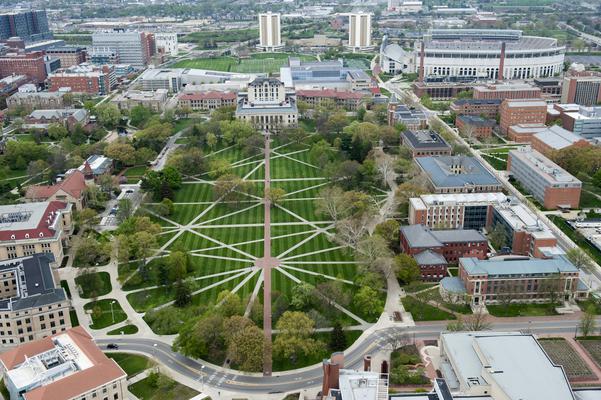The Ohio State University recently announced it is establishing the Center for Quantum Information Science and Engineering (CQISE), building on the momentum around a discipline with far-reaching economic and societal impacts.
Quantum information science and engineering is a broadly interdisciplinary field, with the potential to impact the entire STEAM enterprise through the development of new quantum technologies, the exploitation of those technologies to enhance existing activities, and considerations of the societal and cultural impacts of these transformative changes.
“I am pleased to announce a new Ohio State Center for Quantum Information Science and Engineering, where our scientists and engineers will use the properties of quantum mechanics to transform communications, computation and sensing,” said Kristina M. Johnson, president of Ohio State, during her State of the University address on April 21.
The new center will focus not only on creating synergy among the university’s current activity, but look to build on Ohio State’s emergence as a key leader in pushing the field forward. In July 2021, Ohio State joined the Chicago Quantum Exchange, a growing intellectual hub for the research and development of quantum technology. Then in September, the QuSTEAM initiative led by Ohio State was awarded $5 million from the National Science Foundation to develop a diverse, effective and contemporary quantum-ready workforce by revolutionizing and creating more equitable pathways to quantum science education.
These efforts are being further enhanced by an aggressive faculty recruitment effort, including ongoing searches in computer science and engineering, and an interdisciplinary search for two positions across five departments, including physics, chemistry, computer science and engineering, electrical and computer engineering, and materials science and engineering.
Co-directors for the center are Ezekiel Johnston-Halperin, professor in the College of Arts and Sciences Department of Physics, and Ronald M. Reano, professor in the College of Engineering Department of Electrical and Computer Engineering.

“The inherently interdisciplinary nature of the field necessitates this type of institution-level response,” said Johnston-Halperin. “By increasing collaboration among our best minds in chemistry, biochemistry, physics, computer science, engineering and more, we can solve complex, societal challenges through advancing quantum science.”
“From sensors, to communications, to computing and simulation, advances in quantum information are laying the foundation for a paradigm shift bridging much of modern science and technology,” added Reano. “We’re excited to have this opportunity to establish Ohio State as a leader in this area and help create a quantum-literate workforce that advances with the technologies.”
The center has established goals in research, teaching and outreach and is already developing strategies that support development of the quantum ecosystem at the university. Work is already underway to develop training programs and short courses to train researchers in the scope and use of critical quantum-relevant tools and create seed funding to support interdisciplinary quantum research.
CQISE will also have significant synergy with existing internal and federally supported centers and institutes at the university. These centers focus on research that is either “quantum adjacent” or where there is opportunity to expand into emerging quantum information related directions – including the Institute for Materials Research, Translational Data Analytics Institute, Center for Emergent Materials and Institute for Optical Science.
The launch of the center is part of the university’s strategic plan to increase convergent research opportunities and accelerate societal impact. The center will also provide additional opportunities for collaboration with leading organizations and companies to advance quantum science across sectors.
“It is exciting to see our peers at Ohio State advance research in quantum computing,” said AJ Lang, global chief technology officer at JPMorgan Chase and an Ohio State alumnus. “Given the importance of quantum technology for JPMorgan Chase’s competitive edge long term, we look forward to collaborating with the new Center for Quantum Information Science and Engineering and broadening the pipeline of talent that will support quantum deployment across future financial applications.”
“We’ve been proud to partner with Ohio State on quantum research and in the national effort to prepare a diverse, quantum-ready workforce. The Center for Quantum Information Science and Engineering will help further establish the Midwest as the leading region for the field,” said David Awschalom, the Liew Family Professor in Molecular Engineering and Physics at the University of Chicago, director of the Chicago Quantum Exchange and director of Q-NEXT, a Department of Energy Quantum Information Science Center. “We are excited to work with CQISE to continue developing these collaborations and advance the nation’s emerging quantum economy.”
CQISE will report to the Enterprise for Research, Innovation and Knowledge in partnership with the colleges of Arts and Sciences and Engineering.









